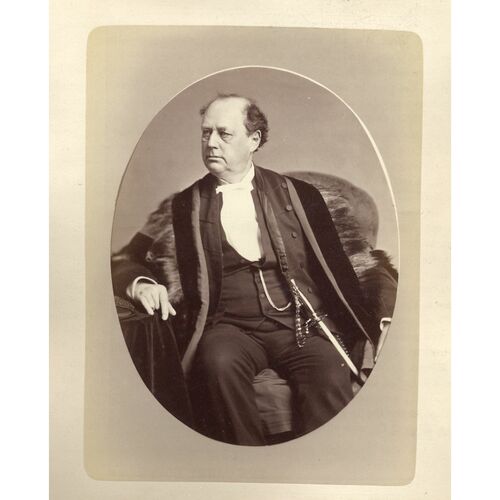LEBLANC, CHARLES-ANDRÉ, lawyer, civil servant; b. 18 Aug. 1816 at Montreal, L.C., of the marriage of Charles Leblanc, craftsman, and Louise Brien-Desrochers; d. 16 Aug. 1877 at Montreal.
Charles-André Leblanc was educated at the old college of Montreal, and had as fellow-students George-Étienne Cartier, Joseph-Amable Berthelot, and Joseph-Ubalde Beaudry; he studied law, and received his legal training under Pierre Moreau. During the troubled days of 1837, when he was 21 years old, he became the youngest member of the Fils de la Liberté. This association, set up on 5 Sept. 1837, comprised more than 700 young men of Montreal. Half civilian and half military, it had two sections which were to work, “one through speech and writing, the other by force of arms if necessary, for the progress and triumph of the people’s cause.” In November 1837 Leblanc was put in prison on a charge of high treason and spent the winter in jail, which did not prevent him from being called to the bar on 30 Sept. 1839.
As a partner first of his original employer Pierre Moreau, later of Francis Cassidy who had become mayor of Montreal, and finally of Alexandre Lacoste*, Charles-André Leblanc had extensive experience at the bar. For 35 years he pleaded before all the courts in Montreal. He was one of the firm supporters of George-Étienne Cartier. Leblanc was a member of the Montreal council of the bar in 1855, syndic in 1858, examiner of candidates for admission to the profession in 1859, bâtonnier in 1863; he was also president of the Société Saint-Jean-Baptiste of Montreal in 1867, and churchwarden of the charitable organization and council of the parish (Notre-Dame) of Montreal, which before the subdivisions made in 1873 numbered nearly 100,000, that is, the entire Catholic population of the town.
Charles-André Leblanc had advocated the opening of a colonization road to the north of Montreal and, as representative of the provincial government, was one of its administrators. He contributed to the founding of the Reform School at Montreal, and also was a member of the Council of Public Instruction. In November 1872, towards the end of his life, he became sheriff of the district of Montreal, an office which consisted principally of seeing to the enforcement of summonses and writs of execution, safeguarding goods and possessions under distraint, having charge of the prisons of his district, and being present at executions. He still held this office when he passed away on 16 Aug. 1877 at Montreal.
In January 1837, at Montreal, while still in training, Charles-André Leblanc had married Julie Dumont, daughter of Philippe Dumont and Julie Valière. They had eight children; one, Elmire, married Mathias-Charles Desnoyers in 1865; another, Mathilde, became the wife of Oscar Dunn*, writer and journalist. Charles-André Leblanc married again, his second wife being Marguerite Wilson, Jean-Baptiste-Alexandre Couillard’s widow.
PAC, MG 30, D62 (Audet papers), 18, pp.71–77 La Minerve (Montréal), 17 août 1877. L’Opinion publique (Montréal), 23 août 1877. Fauteux, Patriotes, 291–92. Pierre Beullac et É.-F. Surveyer, Le centenaire du Barreau de Montréal, 1849–1949 (Montréal, 1949), 61–64. Borthwick, Hist. and biog. gazetteer, 402–3.
Cite This Article
Jean-Jacques Lefebvre, “LEBLANC, CHARLES-ANDRÉ,” in Dictionary of Canadian Biography, vol. 10, University of Toronto/Université Laval, 2003–, accessed December 31, 2025, https://www.biographi.ca/en/bio/leblanc_charles_andre_10E.html.
The citation above shows the format for footnotes and endnotes according to the Chicago manual of style (16th edition). Information to be used in other citation formats:
| Permalink: | https://www.biographi.ca/en/bio/leblanc_charles_andre_10E.html |
| Author of Article: | Jean-Jacques Lefebvre |
| Title of Article: | LEBLANC, CHARLES-ANDRÉ |
| Publication Name: | Dictionary of Canadian Biography, vol. 10 |
| Publisher: | University of Toronto/Université Laval |
| Year of publication: | 1972 |
| Year of revision: | 1972 |
| Access Date: | December 31, 2025 |


![[Charles André Leblanc, sheriff of Montreal] [image fixe] / Studio of Inglis Original title: [Charles André Leblanc, sheriff of Montreal] [image fixe] / Studio of Inglis](/bioimages/w600.4259.jpg)

